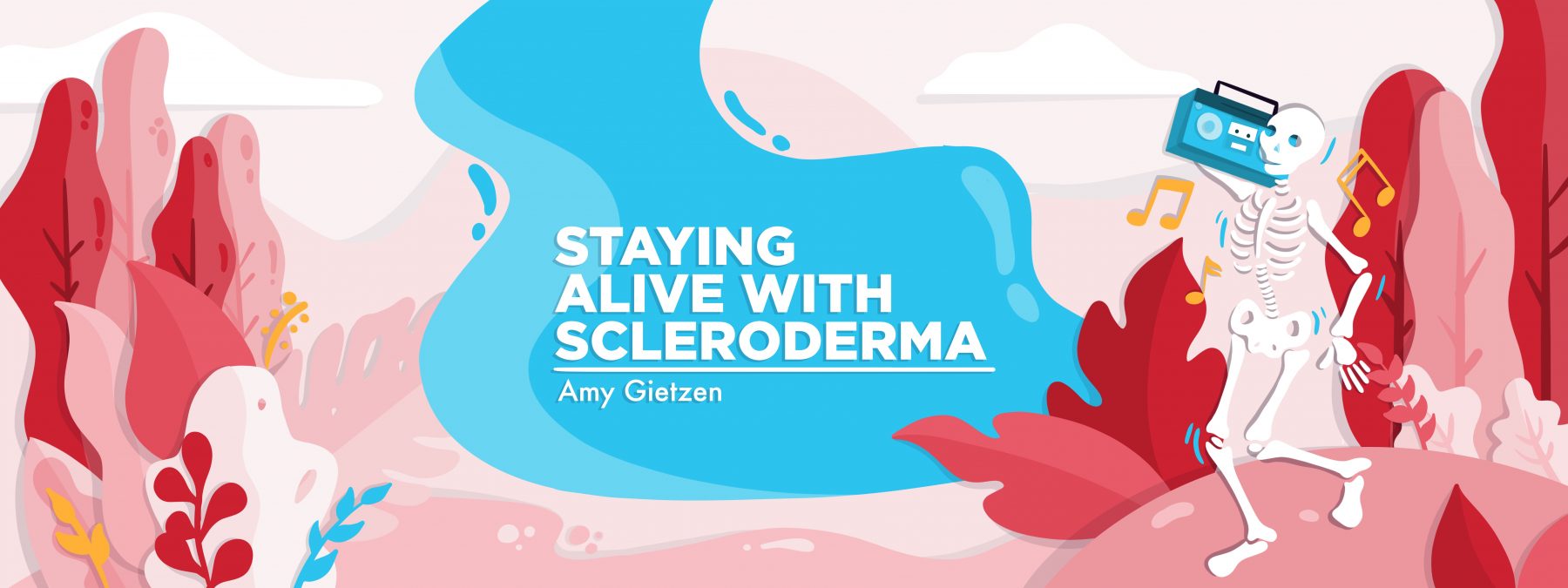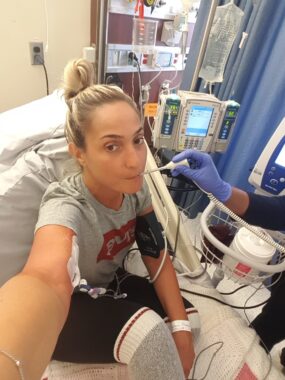The Autoimmune Slayer’s journey since her scleroderma diagnosis
A Canadian advocate tells how she's managed the disease over the years
Written by |

Silvia Petrozza is a powerhouse! Known as the Autoimmune Slayer, she has almost 1,700 Instagram followers and always seems to have her fingers in disease advocacy efforts in Canada. A mother of three, she also has her own business — impressive for a woman living with scleroderma since age 23.
I interviewed her by email. Following are her responses, lightly edited for clarity.
AG: Tell me about your journey to diagnosis.
SP: When I was a teenager, I unknowingly experienced Raynaud’s syndrome. My doctor chalked it up to poor circulation. However, periodically throughout my teenage years, I was sick. But my doctor never really looked into why.
In 2007, within months of having my first child, I was officially diagnosed with scleroderma. My Raynaud’s started progressing rapidly, and the pain became unbearable. I even experienced my first digital ulcer. My sister had been convinced I had lupus. However, after my initial doctor visit, scleroderma was the verdict. I immediately began looking for a specialist, which turned into a long and draining process. Because scleroderma is so rare, I had to travel quite a ways, to Toronto, for adequate care.
How difficult has it been living with scleroderma?
Living with scleroderma is hard! I’ve had to find my “new normal” in order to cope with daily life. Scleroderma can also be unpredictable. Tasks like getting dressed, doing chores, and being a mom can be very difficult. I’ve had to learn to adjust my expectations.

Silvia Petrozza spreads awareness by snapping a picture of herself in the hospital to share on social media. (Courtesy of Silvia Petrozza)
I’ll have days when my pain is manageable. But in order to maintain my status quo, I undergo monthly scheduled infusions of iloprost (synthetic prostacyclin, known by the brand name Ventavis and often used for pulmonary arterial hypertension). These treatments require me to leave my family, travel two hours from home, and then spend two days in bed recovering. Scleroderma doesn’t just affect me, but my family as well.
How have you managed to keep such a positive attitude?
I think I’m just unapologetically real. Of course, feeling like this came with time, but my struggles are what made me who I am. I accept the bad days and push through them. I take what I learn from my experiences and share it with others, hoping it will help them.
What have you done to advocate for scleroderma?
Advocacy is everything! It took some time in the beginning to comprehend that, because I thought if I ignored my disease, I wouldn’t have to deal with it.
Slowly, I became more involved with the scleroderma community. I would talk about my journey on social media, which has made a difference in my life. I realized that my scleroderma community needed me!
When I was first diagnosed, connecting with others wasn’t on my radar. I remember now how alone and scared I felt. My life became a dark place. So being a source of hope and building a sense of community for others empowers me.
Why is scleroderma awareness important to you?
Awareness is vital for this disease, to help find new treatments that will help us live longer, healthier lives and maybe one day even a cure. However, when living with scleroderma, sometimes the little things are a big deal. The daily struggles can really affect our lives — like grocery shopping, picking up coins, or retrieving credit cards from our wallets.
My local grocery store understands that I have deficits. They open a cashier’s line just for me, knowing that I need extra time. They also help with carrying my bags. The more people know about scleroderma, the more the little things we struggle with day to day become easier to manage.
Could Rare Disease Day, Feb. 28, be improved?
It’s hard to say. Scleroderma Society of Ontario has done a fantastic job creating these challenges that people can participate in throughout February. The challenges showcase what it’s like to live with scleroderma as well as great information about the disease.
My wish would be that scleroderma and the people living with it would get more attention. We’re true warriors! Every day we fight this insane battle. I believe we deserve credit for being so relentless and awesome.
What is the No. 1 thing you do to cope with scleroderma?
Laughter, to me, is my medicine. When I post on social media, I’ll sometimes make light of my struggles. It’s just the way I deal with pain and difficult moments. Laughing makes it easier for my loved ones and me to cope.
Note: Scleroderma News is strictly a news and information website about the disease. It does not provide medical advice, diagnosis, or treatment. This content is not intended to be a substitute for professional medical advice, diagnosis, or treatment. Always seek the advice of your physician or other qualified health provider with any questions you may have regarding a medical condition. Never disregard professional medical advice or delay in seeking it because of something you have read on this website. The opinions expressed in this column are not those of Scleroderma News or its parent company, Bionews, and are intended to spark discussion about issues pertaining to scleroderma.







Rayetta
I was diagnosed with scleroderma about 6 months ago. Went to a rheumatologist and was told not to eat fried foods,she left to another hospital and the next rheumatologist said no spicy foods,and come back in 6 months. I am confused about what to eat and do. The pain at times is horrible. Some days I just feel like giving up.
Leah Keitz
NEVER GIVE UP. When I was diagnosed almost five years ago I was devastated. Hearing the specialists who cared for me when I had kidney failure, I was sure I would die. Having felt tired and dragging for several years prier to my diagnosis, I was sure that I didn't have long to live. I will be 81 this week and I am still here. No longer do I dwell on the negative. Yes, I have had to learn how to live with Scleroderma and embrace the bad days because I know there will be some good days as well.
I am not on dialysis thankfully as that was my experience for three and a half months when first diagnosed. The first miracle was being removed from the machine when my kidneys started to function with no further intervention. To me, that was a sign that I could fight this disease and all it has to offer with every being of my body.
My family is my strength. My husband and I have been married for almost 61 years. He is my rock. Our three adult children have been here for me every step of the way, even though they are many mile away. Our eldest son put his own life on hold, moving from California to Florida to become my caregiver. His knowledge and experience in heealth related industries gave me ccomfort and hope.
I am hopeful that those of us who have been dealing with this rare disease will soon see new therapies that will enable us to live our lives without pain and fatigue and further damage to our bodies.
My thoughts and prayers are with us all.
Best
Leah